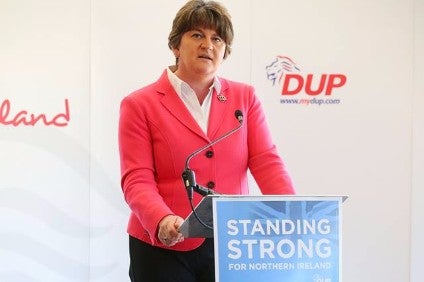Cor Blimey! exclaimed one Labour-leaning UK tabloid this morning (9 June) as the country awoke to another election result that confounded pollsters.
UK Prime Minister Theresa May, against the expectations of the polling companies, political pundits and no doubt herself, has lost the small majority she had in the country’s House of Commons, with Jeremy Corbyn, the leader of the main Opposition party Labour, guiding his party to a series of gains and contributing to what is known here as a “hung Parliament” – meaning no single party has an overall majority of seats in the lower house.
In April, May, elected leader by The Conservative Party last summer in the wake of the UK’s vote to leave the EU, called a snap General Election in a bid, she claimed, to strengthen the country’s government in upcoming talks with Brussels on Brexit, although some saw her decision, made amid polls giving her a 20-point lead over Corbyn and a divided Labour, as a way of delivering a landslide victory and battering the Opposition.
Labour lost the election, let’s be clear, but the results will give Corbyn and his supporters a shot in the arm, after a campaign in which sections of the UK public have warmed to the veteran MP as a person and been convinced by the party’s calls for policies including greater investment in public services.
MIRROR UPDATED: Cor Blimey #tomorrowspaperstoday pic.twitter.com/4g3pM7SXDd
— Neil Henderson (@hendopolis) June 9, 2017
 GlobalData Strategic Intelligence
GlobalData Strategic IntelligenceUS Tariffs are shifting - will you react or anticipate?
Don’t let policy changes catch you off guard. Stay proactive with real-time data and expert analysis.
By GlobalData
However, beyond the praise for Corbyn and beyond the questions about May’s future after what has been a disastrous campaign for her and the Conservatives, the more serious questions surround what will happen about the upcoming Brexit talks between the UK and the EU, which are due to start in ten days.
With the Conservatives no longer commanding a majority in the House of Commons, the results announced overnight are set to deliver nothing like “the strong and stable leadership” May said the UK needed in the Brexit talks and which was a central aim for her asking the country to go back to the polls just two years after her predecessor David Cameron won the Conservatives that small but working majority.
Now, having lost that majority, May faces discussions with Northern Ireland’s Democratic Unionist Party, which, with its ten seats, could provide the Conservatives with a working majority in the House of Commons and, in theory, a means to, first get through the so-called Queen’s Speech – which details the governing party’s overall planned legislative programme – and then give her a mandate to take in the UK into those negotiations with the EU.
Corbyn has said Labour is ready to form a government but the way the seats have fallen across the parties appear to make that difficult. The more likely scenario, at least over the short term, is May will look to govern with the support of the Democratic Unionist Party.
Right now, Westminster civil servants will be poring over the positions of the Democratic Unionist Party on some of the issues that will be central to those talks with Brussels.
The DUP, for example, are said to want the border with the Irish Republic – the UK’s only border with the EU – to be as “seamless and frictionless” as possible.
Arlene Foster, the DUP’s leader, has also spoken out against a so-called “hard Brexit”.
During the campaign, possibly in electioneering mode, May, the former Home Secretary that voted to remain in the EU in last June’s referendum, claimed “no deal would be better than a bad deal” with the 27 other member states.
It appears May and her party will have to accept a more sensible, considered, consensual approach on Brexit will be needed. The Conservatives almost UKIP-lite comments during the campaign clearly did not work. And the prospect of a ‘softer’ stance on Brexit will likely gladden food industry executives in the UK and the EU this morning.
Nevertheless, the EU will be looking on dumbfounded. The bloc was agnostic about which party – and party leader – came into power but it did want clarity on who it would be negotiating with. Last night’s result has caused all kinds of uncertainty on both sides of the Channel. And, should May secure in early talks today with the Democratic Unionist Party, agreement on a working arrangement and should she stand in Downing Street to say Brexit talks will continue as planned, it is very unlikely she will be able to press on in those negotiations withe the positions she had formulated before yesterday’s poll.
Ian Wright, the director general of The Food and Drink Federation, which represents food and soft drink manufacturers operating in the UK, issued a brief statement this morning.
“The nation has delivered its verdict and the country demands leadership at this uncertain time. Politicians across all the parties must come together to deliver in the national interest so the UK’s GBP110bn (US$140.47bn) food and farming industry can continue to thrive. The Brexit clock is ticking loudly and the country will not forgive a failure to act.”
UK election result raises food sector hopes of better Brexit – column





